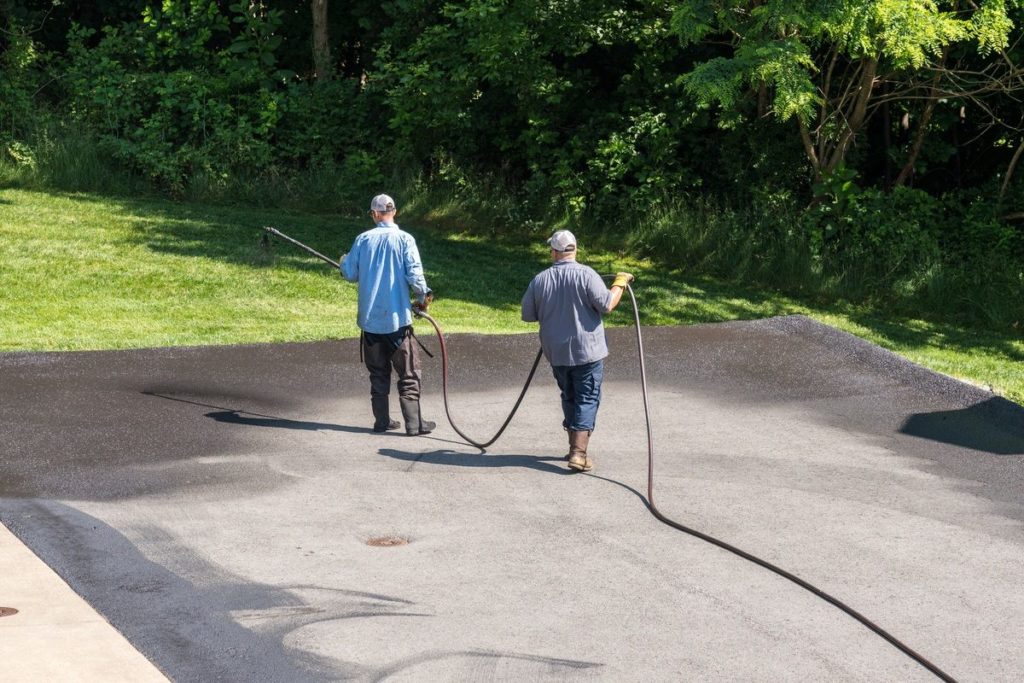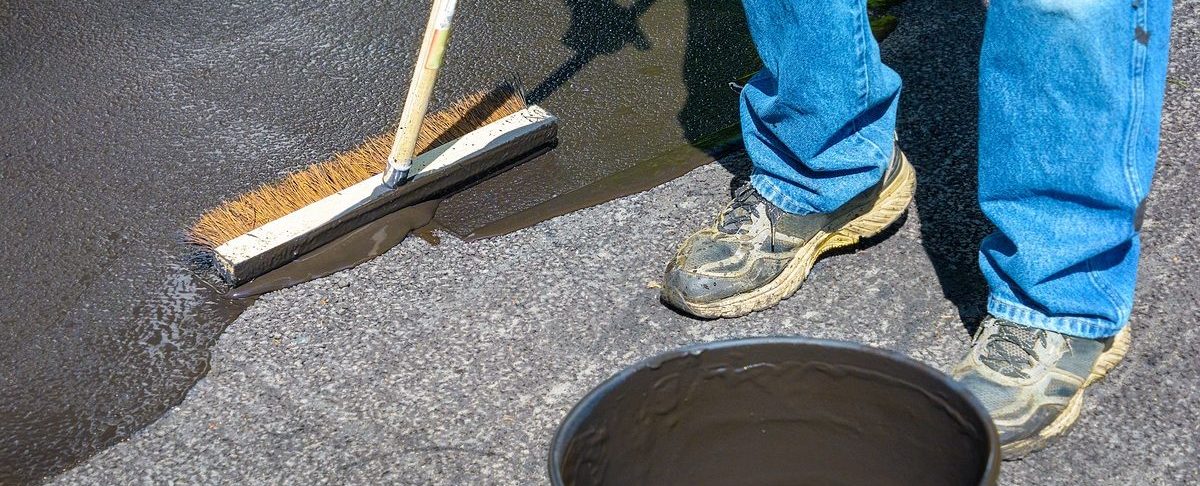Keeping your driveway protected and looking great is important to maintaining your home’s curb appeal and long-term value. One of the most effective ways to preserve your asphalt is through a driveway sealing service. While some homeowners consider taking the DIY route, it’s essential to understand the differences in cost, quality, and long-term results between professional sealing and doing it yourself.
Why Sealcoating Your Driveway Is a Smart Investment
Sealcoating is more than just a cosmetic upgrade; it extends the life of your driveway and prevents costly repairs.
What Sealcoating Does for Your Asphalt
Over time, asphalt is exposed to sun, rain, oil spills, and freeze-thaw cycles. These elements can cause it to dry out, crack, and erode. Left untreated, small cracks may become larger problems requiring cracked asphalt driveway repair. Sealcoating helps prevent that progression by applying a protective layer over the surface. This barrier protects the asphalt from water and air damage, helping to keep your driveway smooth and flexible. It also makes your driveway last longer against daily wear and tear.
Benefits That Go Beyond Protection
Sealcoating also restores the rich black color of your asphalt, giving your home a cleaner, well-kept appearance. It makes snow removal easier and prevents water from seeping into small cracks that could grow larger with time.
When done correctly, sealing your driveway every 2–3 years is one of the most cost-effective maintenance steps a homeowner can take.
Comparing DIY vs. Professional Driveway Sealing Service
Let’s look at what separates DIY sealing from hiring a professional contractor.
DIY Sealing: What You Need to Know
Many homeowners are drawn to DIY sealing because of the lower upfront cost. Sealant is usually priced between $15 and $25 per five-gallon bucket at local hardware stores. For a standard two-car driveway, you might need three to five buckets, plus tools like a squeegee, gloves, and cleaning supplies.
However, DIY sealing comes with several limitations:
- The sealant quality is lower than that of the pros.
- Proper surface prep takes time and experience.
- The application is physically demanding and prone to uneven coverage.
- Mistakes can lead to early peeling or cracking.
Professional Driveway Sealing Service: What You Get
Hiring a professional means you get access to commercial-grade materials, experienced crews, and proven application methods. We clean the surface thoroughly, repair small cracks, and apply the sealant with even, machine-assisted coverage.
Professional services typically cost between $0.30 and $0.50 per square foot in the Richfield and Twin Cities area. For most homeowners, that’s a few hundred dollars for a long-lasting, clean finish with minimal hassle. As you evaluate your options, it’s smart to consider the key questions to ask before hiring a professional driveway sealing contractor. Choosing a professional driveway sealing service often results in better protection, longer durability, and peace of mind.
Long-Term Costs and Value Considerations
It’s important to consider more than just the upfront price tag.
Short-Term Savings vs Long-Term Costs
DIY might save you $100–$200 upfront, but if the sealant fails within a year, you may need to reapply or repair early damage. Professional sealing is built to last, meaning fewer applications over time and less risk of costly structural problems.
Value of Time and Convenience
Applying driveway sealant isn’t quick or easy. The whole process can take a full weekend between cleaning, drying, applying, and curing. Professional crews finish it in a few hours, often with better results. When you factor in your time, material waste, and potential for rework, the value of hiring a driveway sealing service becomes clear.
How Often Should You Seal Your Driveway?
Timing is everything when it comes to effective sealcoating.
Frequency of Sealing
Depending on wear and weather exposure, asphalt driveways should be sealed every 2 to 3 years. New driveways must wait at least six months to a year before the first sealing to allow the asphalt to cure.
Best Time of Year to Seal
We recommend scheduling driveway sealing between May and September when temperatures are consistently above 50°F, and rain is less likely to disrupt curing. Early spring and late summer are our busiest times, so booking early is smart.
Keeping your sealing on schedule protects your asphalt and reduces the risk of expensive repairs later. If you’re responsible for maintaining shared community roads, this schedule also applies to how to maintain blacktop roads in a neighborhood. Keeping up with regular sealing protects the pavement, preserves property value, and reduces the need for large-scale repairs over time.
What to Look for in a Driveway Sealing Contractor
Not all contractors provide the same level of service. Here are the key qualities to consider:
Key Qualities of a Reliable Service
- Uses commercial-grade sealer made for Minnesota climates
- Preps surface thoroughly with power cleaning and crack filling
- Provides precise, written estimates and timelines
- Offers warranties on quality and material performance
- Has strong local reviews and a track record of success
Choosing the right partner means getting results that last through Minnesota winters and keep your driveway looking great. Evaluate potential contractors to find the best fit for your needs and protect your investment.
Invest in Professional Driveway Sealing That Pays Off

Sealcoating is an integral part of preserving your driveway, and comparing the DIY approach to a professional driveway sealing service shows clear advantages in quality, durability, and time savings. With commercial-grade materials, expert prep, and better coverage, hiring a professional ensures your driveway stays in top condition year after year.
Protecting your driveway isn’t just smart. It’s easy when you choose the right service. Contact Richfield Blacktop today to schedule your sealing project with Richfield’s trusted asphalt experts. Let us help you protect your pavement with lasting results.




